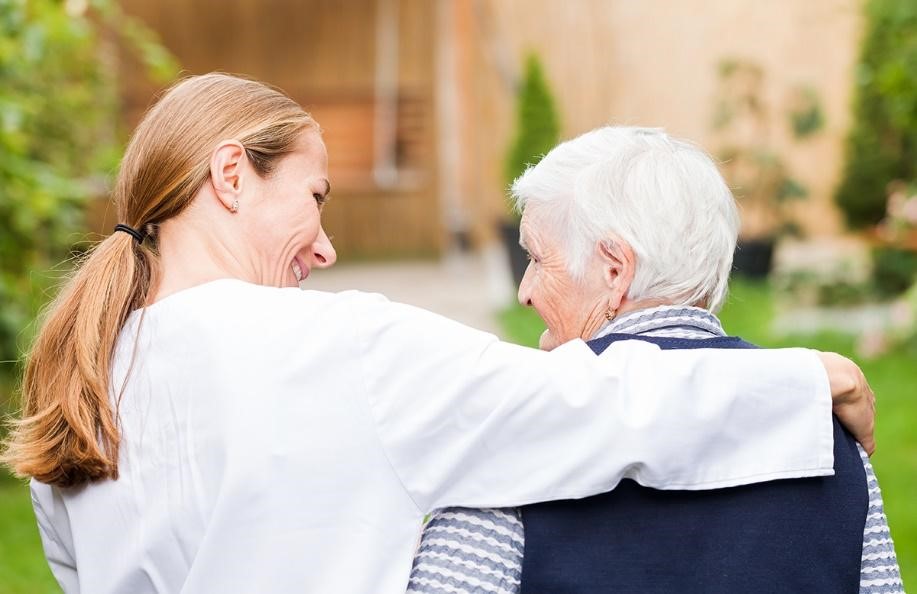Arthritis is a common condition that affects millions of seniors in the United States and around the world. It is important for seniors to stay educated on the disease and know their options so they can get appropriate care.
Here are the most common types of arthritis seniors and families should be aware of.
Osteoarthritis
Osteoarthritis is caused by the gradual wear and tear of the cartilage between joints, leading to pain, swelling and immobility. It is most commonly seen in seniors over the age of 65 due to their increased risk for joint damage from years of wear and tear.
Symptoms of osteoarthritis can include stiffness and joint pain, particularly when they are used excessively or after sitting in one position for too long. The pain can be worse as an activity progresses and even lead to a decrease in mobility.
In order to slow down the progression of osteoarthritis and manage its symptoms, there are a variety of treatments available, depending on which type of arthritis you have been diagnosed with. These can include lifestyle changes such as maintaining a healthy weight through exercise and eating a balanced diet; medications such as non-steroidal anti-inflammatory drugs; physical therapy; hot or cold compresses; splints or braces for support; injections for relief from local pain or inflammation; nerve stimulation techniques; surgery if necessary; and complementary therapies such as massage or acupuncture.
It’s important for seniors who suffer from osteoarthritis to stay informed about their condition so that they can make educated choices about their care and treatment options. By working with their health care provider, seniors can find strategies that work best for them so that they can maintain a good quality of life despite living with this chronic condition.
Rheumatoid Arthritis
Rheumatoid arthritis (RA) is an unpredictable condition and autoimmune disease that can range widely in severity and affects people of all ages. The most common symptoms of RA include joint pain, swelling and stiffness.
One of the best methods for managing RA is to identify its underlying cause and treat it accordingly. This typically involves taking medications to relieve pain such as non-steroidal anti-inflammatory drugs (NSAIDs), corticosteroids, biologic agents that target specific parts of the immune system, other immunosuppressants or a combination of all three.
In addition to medical treatments for RA, there are also lifestyle changes that can help improve overall health and alleviate some of the pain associated with this condition. These include regular exercise (in consultation with your doctor), eating a balanced diet with plenty of fruits and vegetables; avoiding smoking; limiting intake of alcohol; stress reduction methods; maintaining an optimal weight; using hot or cold compresses on painful areas; getting sufficient rest; eating foods rich in omega-3 fatty acids and Vitamin D; wearing low-heeled shoes with good arch support to reduce foot strain; avoiding contact sports when possible; using assistive devices such as walking sticks or crutches when necessary to improve mobility; and using cognitive behavioral therapy or other psychotherapy techniques to learn how to better cope with physical limitations due to RA.
By understanding the causes behind their RA diagnosis and taking steps to mitigate potential flare ups through medical treatments like medication, combined with lifestyle modifications like these recommendations above, those who suffer from rheumatoid arthritis can lead more comfortable lives despite living with this challenging condition.
Gout
Gout is a type of arthritis that occurs when there is uric acid crystals built up in the body. Uric acid is normally present in the blood, but when it builds up and crystallizes, it can cause severe pain and swelling around joints or multiple joints in the body. Uric acid buildup develops when the body produces too much of the acid or is unable to excrete it fast enough.
Common symptoms of gout include intense joint pain that comes on suddenly and lasts for a few days; joint inflammation and redness; swelling around affected joints; fever and chills; fatigue; and difficulty moving affected joints.
The most common treatment for gout is medications that lower levels of uric acid in the blood or reduce its production altogether. Lifestyle changes such as eating a balanced diet low in purine-rich foods like red meat, shellfish, organ meats, legumes, beer, sweetened drinks, processed foods and high fructose corn syrup are also important for managing gout flare-ups. Additionally, regular exercise can help lower uric acid levels in the body naturally while also helping with weight management, which can also help alleviate gout symptoms.
By working with their health care provider those affected by this painful condition may be able to find strategies that work best for them so they can avoid flare ups while still living a fulfilling life.
Psoriatic Arthritis
Psoriatic arthritis (PsA) is a type of inflammatory arthritis that affects individuals with psoriasis, an inflammatory skin condition. It can cause pain, stiffness, swelling and reduced mobility in the joints as well as fatigue. In some cases, it may even lead to joint destruction or deformity if left untreated.
Common symptoms of PsA include pain, swelling and stiffness in the small or large joints; nail changes; lower back pain; painful tendons; and morning stiffness. Additionally, those affected may feel tiredness and fatigue due to the effects of the disease on their bodies. It’s important for those who suffer from both psoriasis and arthritis to be aware of these potential signs so they can seek treatment early on in order to prevent further damage or disability from developing over time.
Treatment for PsA will often depend upon the severity of the patient’s symptoms, but typically involve medications such as non-steroidal anti-inflammatory drugs (NSAIDs), oral corticosteriods, disease-modifying antirheumatic drugs (DMARDs), biologic agents that target specific parts of the immune system, other immunosuppressants or a combination of all three. In addition to medical treatments, lifestyle modifications are important for managing psoriatic arthritis (PsA) flare ups and maintaining overall health. These include regular exercise, eating a balanced diet with plenty of fresh fruits and vegetables, avoiding smoking and limiting alcohol consumption. Stress reduction techniques while maintaining a healthy weight provides further relief.
It is possible to manage PsA so people affected by this condition can still lead comfortable lives despite having it. With proper awareness about their conditions and treatments options available those affected can work with their health care provider to find strategies that work best for them so they can reduce flare ups and reduce pain.
Ankylosing Spondylitis
Ankylosing spondylitis (AS) leads to spinal stiffness, chronic back pain and decreased mobility over time if left untreated.
Common symptoms of AS include reduced range of motion in the neck, shoulders or hips; loss of appetite; difficulty sleeping due to pain; and chronic pain from the lower back radiating down into the buttocks or up into the neck. Additionally, some people may experience fever, weight loss, weakness, or severe joint pain, swelling and redness, scoliosis (abnormal curvature of the spine), or decreased height due to fusion between vertabrae as a result of this condition.
Treatment for AS typically involves medication such as non-steroidal anti-inflammatory drugs (NSAIDs), corticosteroids, immunosuppressants and biologics that target specific parts of the immune system. Physical therapy can also help with stretching and strengthening exercises aimed at improving flexibility, posture, gait and alleviating pain while lifestyle changes such as eating a balanced diet with lots of fruits and vegetables are important for overall health while living with this condition.
It is possible to manage AS so people affected by this condition can still lead comfortable lives despite having it. With proper awareness about their conditions and treatments options available those affected by it can work with their health care provider to find strategies that work.
Home Care Agency Near Me
For those looking for a great Cleveland home care option for seniors with severe arthritis, Cherished Companions is an excellent choice. Cherished Companions provides customized home care services that are designed to not only meet the physical needs that come with aging, but also to offer emotional and mental support. Our team of caregivers specialize in helping seniors manage their chronic joint pain while also aiding in activities such as light housekeeping, meal preparation and errand-running.
In addition to the basic home care services that Cherished Companions offers, we also provide additional support such as personal care services; assistance with ambulation and mobility devices; transportation services; personal shopping; medication reminders; accompaniment to doctor’s appointments; help filing long term care insurance paperwork and more.
For those seeking trustworthy home care for a senior loved one suffering from arthritis, Cherished Companions provides a comprehensive suite of services designed to meet both the physical and emotional needs of its clients.
With experienced certified caregivers on staff, you can trust that your senior loved one will be taken care of with compassion, respect and dignity so they can live a comfortable life despite their diagnosis.
Contact us today with any questions!






